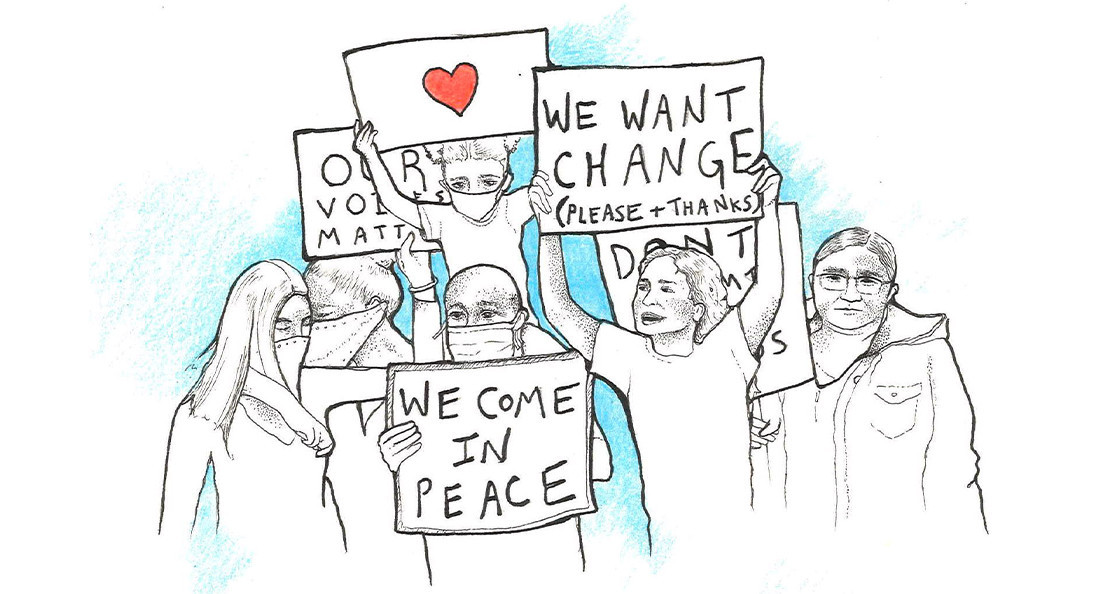In law we trust
Demanding legal protests is a catch-22
In their amendment, the provincial NDP summed up the throne speech, presented by the Pallister government on Oct. 7, as having “failed to offer any acknowledgement of the needs of black, Indigenous or people of colour, BIPOC, Manitobans.”
This is not surprising, given the government’s stated commitment to introducing “legislation to prevent such illegal blockades of critical transportation routes and protect jobs.” Suffice to say that this proposal is implicitly responding to the road blockades by the four Keeyask Cree Nations communities to the construction site of the Keeyask generating station in the spring of 2020.
What is at risk, according to the government, is the economy. They claim that this proposed legislation will keep critical transport routes open and protect jobs, stating “Manitoba experienced the negative economic effects of illegal protests and blockades, putting the livelihoods of people and communities at risk.”
The Keeyask protests began as an attempt to shut down construction and stop the spread of COVID-19 to communities that are ill-equipped to handle the spread of the virus. That being said, to which livelihoods and communities are the throne speech referring?
The blockade protests are not violent. But they are unlawful. And that’s the problem.
An article in The Globe and Mail from February 2020 states, in relation to the Wet’suwet’en railroad blockades, that “it is worth remembering that the right to protest is part of the right to free speech and peaceful assembly. You can make your voice heard in a public place, but there’s no constitutional right to physically block or occupy anything ... at the end of the day, the rule of law must be enforced.”
In the throne speech, the government echoes this sentiment: “As Canadians, we are rightly proud of our democratic institutions and processes, built upon a foundational respect for the rule of law. Legal protest has helped shape our democracy and must be protected and cherished.”
To be clear on what is legal: in Winnipeg, a permit is required for a protest, rally or demonstration. The requirement to follow such bureaucratic procedures in order to protest the institution seems absurd.
In Canada, protestors can be arrested for causing a disturbance and for unlawful assembly, among many other reasons. Nearly any kind of protest that inconveniences the oppressor may warrant an arrest, creating a catch-22 where the mere act of dissent may be perceived as illegal, making it difficult to do anything that resembles a protest in a way that is legal.
Protesters hosted a demonstration in response to the proposed anti-blockade law, gathering on Highway 75 near Morris on Oct. 9. Their intent was also to show solidarity with the community of Six Nations in Caledonia, Ont., where demonstrators have recently been arrested.
It isn’t fair to ask marginalized communities for lawful protest when laws often largely miss the mark on human rights. Many laws in Canada fail to account for the socioeconomic realities of Indigenous communities. Recent proposed changes to the Child and Family Services (CFS) system in Manitoba come to mind as one example.
A recent article for the Foundation for Economic Education, which claimed that the riots in the wake of the death of George Floyd are unproductive, pinpointed that “the origins of these systemic issues (are) in our criminal justice institutions, legal frameworks, judicial doctrines, etc.” This, of course, is true of Canadian institutions, too.
If the government passes legislation on further criminalizing protest, it will only make it more difficult for citizens to engage in the kind of democratic discourse the government supposedly reveres. It’s already challenging for people to have their voices heard. A critical step we can take to change this is to ensure that oppressive laws, like the ones proposed in the throne speech, are not passed.
Charlie Morin primarily writes and draws humour. As a queer person, they recognize they have benefited from the results of many non-legal protests.
Published in Volume 75, Number 07 of The Uniter (October 29, 2020)








